Investors refuse to be suckered back into the stock market
Stock-Markets / Financial Markets 2010 Oct 02, 2010 - 03:06 AM GMT U.S. Postal Service Had $6 Billion Loss in 2010
U.S. Postal Service Had $6 Billion Loss in 2010
(Bloomberg) The U.S. Postal Service, whose request for a rate increase was turned down this week, had a $6 billion loss in the fiscal year that ended yesterday, Postmaster General John Potter said.
The agency, which sought permission from its regulator to raise rates an average of 5.6 percent, had forecast a loss of $7 billion in the 2010 fiscal year. The loss is before a $2 billion non-cash adjustment for workers’ compensation liability, which is increasing because of lower interest rates, Potter told reporters today in Washington.
ISM U.S. Manufacturing Index Decreased to 54.4 in September
(Bloomberg) Manufacturing expanded in September at the slowest pace in 10 months, underscoring the Federal Reserve’s forecast of “modest” U.S. growth in coming months. The Institute for Supply Management’s factory index dropped to 54.4 from 56.3 in August, the Tempe, Arizona-based group said today. Readings greater than 50 signal growth and economists forecast a decline to 54.5, according to the median estimate in a Bloomberg News survey. Measures of orders and production fell to the lowest level since June 2009.
SEC Releases Final Flash Crash Report - Waddell And Reed Blamed As Selling Catalyst
(ZeroHedge) …on May 6, when markets were already under stress, the Sell Algorithm chosen by the large trader to only target trading volume, and neither price nor time, executed the sell program extremely rapidly in just 20 minutes." In other words, there never was, is and never will be any liquidity in the allegedly most liquid market - ES. Good luck to all those who hope to sell the second there is a second flash crash.
Investors refuse to be suckered back into the stock market.
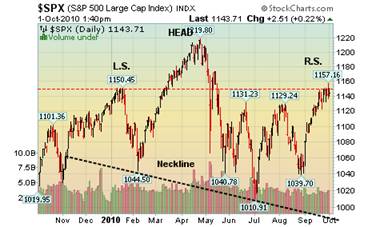 --(ZeroHedge) The massive, and completely unjustified, September ramp in stocks has done nothing to restore investor faith in a broken market: ICI has just reported that in the week ended September 22, domestic equity mutual funds saw a 21st sequential outflow of $2.5 billion, bringing the total Year To Date to over $70 billion. And here is the kicker: the programmed stock rally in September which was supposed to "restore" confidence in the market has resulted in $16 billion worth of September... outflows. The punchbowl is about to be removed.
--(ZeroHedge) The massive, and completely unjustified, September ramp in stocks has done nothing to restore investor faith in a broken market: ICI has just reported that in the week ended September 22, domestic equity mutual funds saw a 21st sequential outflow of $2.5 billion, bringing the total Year To Date to over $70 billion. And here is the kicker: the programmed stock rally in September which was supposed to "restore" confidence in the market has resulted in $16 billion worth of September... outflows. The punchbowl is about to be removed.
Are Treasury Bonds getting their second wind?
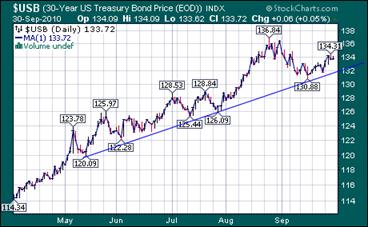 -- Treasuries declined, paring their third weekly gain, as optimism that the global economic recovery will be sustained boosted stock markets and reduced demand for the relative safety of fixed-income assets. The recent rally in stocks seems to have taken the steam out of the Long Bond. But note that bonds have started their recovery as stocks lose momentum.
-- Treasuries declined, paring their third weekly gain, as optimism that the global economic recovery will be sustained boosted stock markets and reduced demand for the relative safety of fixed-income assets. The recent rally in stocks seems to have taken the steam out of the Long Bond. But note that bonds have started their recovery as stocks lose momentum.
Gold up for 11 consecutive sessions.
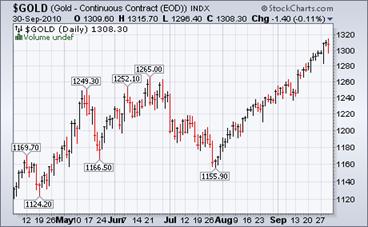 --Gold futures climbed to another record on investor demand for an alternative to the slumping dollar. The dollar fell to the lowest level since January against a basket of currencies, partly on speculation that the Federal Reserve will ease monetary policy further to stimulate the U.S. economy. Gold reached an all-time high of $1,322 an ounce. Since Sept. 14, the metal has climbed to a record in 11 sessions
--Gold futures climbed to another record on investor demand for an alternative to the slumping dollar. The dollar fell to the lowest level since January against a basket of currencies, partly on speculation that the Federal Reserve will ease monetary policy further to stimulate the U.S. economy. Gold reached an all-time high of $1,322 an ounce. Since Sept. 14, the metal has climbed to a record in 11 sessions
Japan is dealing with deflation
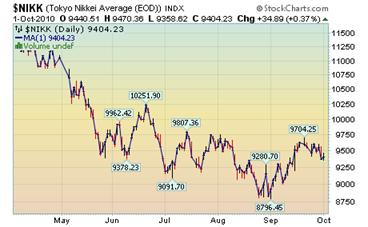 --Japan’s deflation moderated and the unemployment rate fell, indicating the nation’s recovery remains intact as policy makers consider stimulus measures to protect the economy from a strengthening yen. Consumer prices excluding fresh food slid 1 percent in August from a year earlier after falling 1.1 percent in July, the statistics bureau said today in Tokyo. The jobless rate dropped to 5.1 percent from 5.2 percent, while the number of people no longer in the labor force increased, it said.
--Japan’s deflation moderated and the unemployment rate fell, indicating the nation’s recovery remains intact as policy makers consider stimulus measures to protect the economy from a strengthening yen. Consumer prices excluding fresh food slid 1 percent in August from a year earlier after falling 1.1 percent in July, the statistics bureau said today in Tokyo. The jobless rate dropped to 5.1 percent from 5.2 percent, while the number of people no longer in the labor force increased, it said.
China’s manufacturing is ramping up.
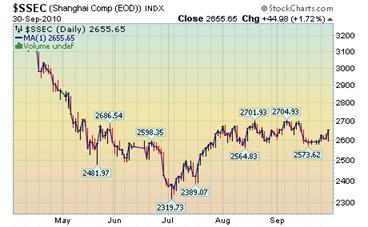 -- China’s manufacturing expanded at the fastest pace in four months in September, adding to signs that economic growth is stabilizing even as the government curbs energy use and tries to cool the property market. The data reinforce evidence from a separate purchasing manager survey two days ago that China’s industries are gearing up again after the economy slowed in the second quarter.
-- China’s manufacturing expanded at the fastest pace in four months in September, adding to signs that economic growth is stabilizing even as the government curbs energy use and tries to cool the property market. The data reinforce evidence from a separate purchasing manager survey two days ago that China’s industries are gearing up again after the economy slowed in the second quarter.
The Dollar Declines.
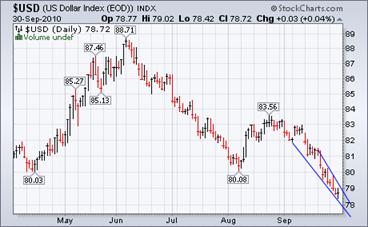 -- The dollar fell to the lowest level since March versus the euro and dropped against the yen after U.S. manufacturing expanded at the slowest pace in 10 months, damping demand for U.S. assets.
-- The dollar fell to the lowest level since March versus the euro and dropped against the yen after U.S. manufacturing expanded at the slowest pace in 10 months, damping demand for U.S. assets.
Everyone is now expecting more Quantitative Easing from the Federal Reserve, therefore a weaker dollar. However, our trading partners are taking different view. How hard will they push back?
Foreclosure Errors Cloud Homeownership With `Blighted Titles'
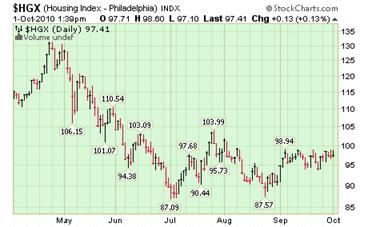 -- U.S. courts are clogged with a record number of foreclosures. Next, they may be jammed with suits contesting property rights as procedural mistakes in those cases cloud titles establishing ownership. “Defective documentation has created millions of blighted titles that will plague the nation for the next decade,” said Richard Kessler, an attorney in Sarasota, Florida, who conducted a study that found errors in about three-fourths of court filings related to home repossessions.
-- U.S. courts are clogged with a record number of foreclosures. Next, they may be jammed with suits contesting property rights as procedural mistakes in those cases cloud titles establishing ownership. “Defective documentation has created millions of blighted titles that will plague the nation for the next decade,” said Richard Kessler, an attorney in Sarasota, Florida, who conducted a study that found errors in about three-fourths of court filings related to home repossessions.
Retail Gasoline prices ease, but higher than last year.
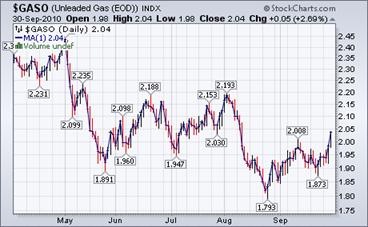 --The Energy Information Agency weekly report observes, “From January through June 2010, 2.0 million barrels per day of Canadian crude oil were imported into the United States, of which 1.2 million barrels per day went into the Midwest. According to the Canadian National Energy Board, almost half of the crude oil exported to the United States was either synthetic crude or blended bitumen from the Alberta oil sands.”
--The Energy Information Agency weekly report observes, “From January through June 2010, 2.0 million barrels per day of Canadian crude oil were imported into the United States, of which 1.2 million barrels per day went into the Midwest. According to the Canadian National Energy Board, almost half of the crude oil exported to the United States was either synthetic crude or blended bitumen from the Alberta oil sands.”
Natural gas prices decrease on mild weather.
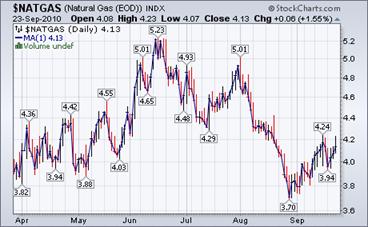 -- The U.S. Energy Information Administration reports, “Natural gas spot prices at most market locations in the lower 48 States decreased between 5 and 10 percent this report week (Wednesday to Wednesday, September 22–29). The week coincided with the first week of fall, a season in which demand is typically lower given the lack of extreme weather conditions across the country.”
-- The U.S. Energy Information Administration reports, “Natural gas spot prices at most market locations in the lower 48 States decreased between 5 and 10 percent this report week (Wednesday to Wednesday, September 22–29). The week coincided with the first week of fall, a season in which demand is typically lower given the lack of extreme weather conditions across the country.”
Jim Grant Accuses Fed Of "Lethal" Intervention And Manipulation Of US Economy
(ZeroHedge) Yesterday Jim Grant gave an interview to Bloomberg's Pimm Fox, which was as usual informative and entertaining, and thus must see. Yet the section which is most relevant for our post-capitalist society (one is unsure what defines it best: communism? socialism? fasism? farcism? idiocy?) is Grant's discussion of H. Parker Willis, one of the founders of the Federal Reserve in 1913, who in a book written two decades later laments the very existence of the Fed.
The linked video is a “must watch.”
Massive Mortgage Mess Update: Title Companies Stop Insuring Foreclosed Properties
(ZeroHedge) Today's latest chapter in what is now known as the new 3M: the Massive Mortgage Mess, is that Fidelity National has told lenders to halt foreclosures, and to stop sales of bank owned properties. The reason, and this should be no surprise to anyone, is "possible document flaws."
From the NYT: As more defaulting homeowners become aware of the lenders’ problems, they are expected to hire lawyers and challenge the proceedings against them. And if completed foreclosures were not properly done, families who bought the troubled homes could be vulnerable to claims by the former owners.
(Mish) Thomas M. Hoenig, dressed in a gray suit, white shirt with French cuffs, and baby-blue tie, faces an edgy crowd of 150 people in a hotel meeting room in suburban Lenexa, Kan. A large “Kansas City Tea Party” banner covers a table at the door. Attendees wear anti-tax stickers on their lapels. This is not an after-dinner speech for which most central bankers would volunteer.
Hoenig smiles at his audience and begins: “This is a support-the-Fed rally, right?”
Dead silence. Then the room erupts in laughter. Disarmed, the Tea Partiers listen politely as Hoenig defends the Federal Reserve as an indispensible institution, even if at the moment, he says, it happens to be heading in the wrong direction.
Morgan Stanley Confirms Fed Has Rendered Fundamentals, Valuations And "Almost Everything Else" Meaningless
(ZeroHedge) Jim Caron has some truly brilliant comments this morning which should be read by all who think they have any handle on the market: "The fixation on QE comes at a price. It is that interest rate volatility will rise due to the uncertainties surrounding QE. And since the performance of interest rates is closely tied to the performance of risky assets, including gold and the USD, then it follows that volatility in those assets may rise as well. Investment decisions across many asset classes today are tantamount to an educated guess on what the Fed decides to do regarding QE. In the near-term this trumps fundamentals, valuations and almost everything else. Thus the risk in the market is man-made, not freely determined by the market. In general, this is not a good thing because it may invite greater risks in the future...If the Fed does not follow through with QE as the market expects, then risky assets may suffer."
Traders alert: The Practical Investor is currently offering the daily Inner Circle Newsletter to new subscribers. Contact us at tpi@thepracticalinvestor.com for a free sample newsletter and subscription information.
Our Investment Advisor Registration is on the Web
We are in the process of updating our website at www.thepracticalinvestor.com to have more information on our services. Log on and click on Advisor Registration to get more details.
If you are a client or wish to become one, please make an appointment to discuss our investment strategies by calling Connie or Tony at (517) 699-1554, ext 10 or 11. Or e-mail us at tpi@thepracticalinvestor.com .
Anthony M. Cherniawski, President and CIO http://www.thepracticalinvestor.com
As a State Registered Investment Advisor, The Practical Investor (TPI) manages private client investment portfolios using a proprietary investment strategy created by Chief Investment Officer Tony Cherniawski. Throughout 2000-01, when many investors felt the pain of double digit market losses, TPI successfully navigated the choppy investment waters, creating a profit for our private investment clients. With a focus on preserving assets and capitalizing on opportunities, TPI clients benefited greatly from the TPI strategies, allowing them to stay on track with their life goals
Disclaimer: The content in this article is written for educational and informational purposes only. There is no offer or recommendation to buy or sell any security and no information contained here should be interpreted or construed as investment advice. Do you own due diligence as the information in this article is the opinion of Anthony M. Cherniawski and subject to change without notice.
Anthony M. Cherniawski Archive |
© 2005-2022 http://www.MarketOracle.co.uk - The Market Oracle is a FREE Daily Financial Markets Analysis & Forecasting online publication.



